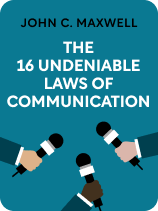

This article is an excerpt from the Shortform book guide to "The 16 Undeniable Laws of Communication" by John C. Maxwell. Shortform has the world's best summaries and analyses of books you should be reading.
Like this article? Sign up for a free trial here.
Do you put yourself in your audience’s shoes? Do you speak about things that you don’t really have a good handle on?
According to expert John C. Maxwell, effective speakers have three characteristics: They focus on connection, develop their credibility, and pursue constant learning. He explains the importance of these traits and provides practical tips on how to develop them.
Read more to understand the three characteristics of effective speakers, according to John C. Maxwell.
3 Characteristics of Effective Speakers
According to Maxwell, effective communication starts with the speaker: Your identity, actions, and values affect the way you speak and how others view you. Before you can sway your audience with your words, you must first win them over with your character. He discusses three characteristics of effective speakers and shows you how to make them your own.
(Shortform note: It may be easier than Maxwell implies to win someone over with your character. In How Highly Effective People Speak, Peter D. Andrei explains that the cognitive bias called the halo effect makes people like you if they only perceive one positive trait of yours. This bias occurs because people tend to form impressions based on the first traits they notice. If people notice something positive about you first, they naturally assume you have other good qualities too. Perhaps, then, you may win your audience over by demonstrating even one of Maxwell’s characteristics of an effective speaker.)
#1: Communicate for Connection
According to Maxwell, your primary goal when communicating should be to connect with your audience and to provide them with valuable and meaningful content. Connection is crucial because it breaks down barriers that prevent people from listening to you, which makes them more receptive to you and your ideas. To build a connection with your audience, Maxwell suggests you give them your full focus when speaking—pay attention to their needs instead of trying to make yourself or your message appear flawless. People won’t care about your words if they don’t believe you care about them.
To show the audience that you care, actively put yourself in their shoes: Consider what they feel, think, and desire, and make them feel valued in ways that are important to them. You can do this by interacting with them, expressing your gratitude, or celebrating their accomplishments. Maxwell suggests you make your audience more receptive to you by removing mental and physical barriers. For instance, be friendly and create a comfortable atmosphere so that your audience feels at ease. Or, instead of standing behind a large podium, try sitting by the edge of the stage.
When you focus on your audience and make them feel good, you make a positive first impression, Maxwell writes. When your audience feels positive about you, they will naturally like you more and be more open to your ideas.
#2: Strengthen Your Credibility
To become a compelling speaker, you must establish your credibility—your trustworthiness and believability. When audiences view you this way, they’ll take you more seriously and will be more willing to consider your message. Maxwell suggests several ways to make yourself more credible.
1. Ensure your message matches your true beliefs. To be credible in the eyes of others, you must genuinely believe in the message you’re delivering. Learn to understand and accept your authentic self so you can communicate your true beliefs with consistency and sincerity. When you’re confident in your message, you naturally use more powerful language and convey more emotion. When your audience believes your words are sincere, they’ll be more open to listening to you.
2. Support your words with your actions. Follow your own advice before giving it to others. Otherwise, you risk people viewing you as a hypocrite, and they may be less likely to listen to you. For example, if you argue that organization is key to productivity, but you display an obvious lack of organization, your audience won’t be receptive to your message.
3. Develop the necessary expertise to speak about your subject. Maxwell writes that you must first learn, build skills, and become knowledgeable in the area you want to discuss. By dedicating time and effort to becoming competent in your field, people will perceive you as more trustworthy and credible when you present your ideas.
#3: Be a Lifelong Learner
Many of us assume that good communicators simply have a natural gift. Maxwell argues, however, that this isn’t true: Speaking well in front of an audience requires dedicated practice, and you must treat it as a lifelong learning endeavor. Effective speakers know that there are always better ways to connect with their audiences and deliver more engaging messages.
To continually learn and improve your communication skills, Maxwell offers two tips:
1. Learn from others. Good communication takes time and experience. By watching other speakers, you can learn from their experiences and gain new ideas more quickly than if you practice your speaking skills through trial and error alone. Make use of a variety of resources—attend a TED Talk, watch YouTube videos, or read transcripts of historical speeches, for instance.
2. Grow your knowledge. Maxwell suggests you continually research new topics and try new experiences to gain fresh perspectives and ideas that you can speak about. Collect quotes, stories, facts, and other information that resonate with you in your daily life. This ensures you have a well of good content that you can draw upon when needed.

———End of Preview———
Like what you just read? Read the rest of the world's best book summary and analysis of John C. Maxwell's "The 16 Undeniable Laws of Communication" at Shortform.
Here's what you'll find in our full The 16 Undeniable Laws of Communication summary:
- The secrets to becoming a confident and effective communicator
- How anyone can master public speaking, no matter how nervous they get
- How to write a clear and engaging speech






